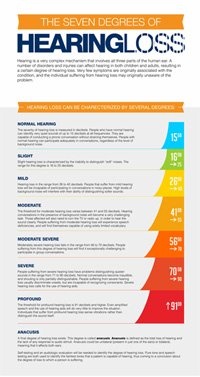- Home
- Blog
- Noise-Induced Hearing Loss
- The Seven Degrees of Hearing Loss

 Hearing loss is a general term that encompasses a wide range of problems and various degrees of disability. Hearing is one tremendously complex process that can be affected by a wide range of medical conditions and injuries.
Hearing loss is a general term that encompasses a wide range of problems and various degrees of disability. Hearing is one tremendously complex process that can be affected by a wide range of medical conditions and injuries.
Our infographic provides detailed information about the seven degrees of hearing loss and their characteristics. Hearing loss is measured in decibels and while people suffering from the slight loss may experience problems with soft sounds, the ones that have a severe condition will be incapable of participating in social interactions and leading a life of full value.
Common Causes of Hearing Loss
All seven degrees of hearing loss are caused by the same medical conditions, lifestyle factors, and injuries.
Congenital hearing loss is the one experienced at birth. Acquired hearing loss is experienced by people who had normal hearing in the past. Acquired loss can be caused by ear infections, the use of medications that are toxic to the ear, measles, meningitis, flu, mumps, heavy injuries, and exposure to significant levels of noise over a long period of time.
Loud noise is extremely detrimental to the proper functioning of the ear. The level, the strength and the duration of the exposure can all impact hearing. Damaging sound levels are once again measured in decibels. Sounds of 150dB are described as extremely painful. Fireworks at a distance of three feet produce a sound of 150dB. Jackhammers, jet plane takeoffs, and sirens are characterized as other “painful” sounds.
To decrease the risk of hearing loss in such circumstances, individuals need to get in the habit of using the right kind of ear protection. A few basic preventive practices can do a lot in terms of maintaining normal hearing.
How the Seven Degrees of Hearing Loss Affect Lifestyle
As the infographic shows, the individuals affected by each degree of hearing loss will experience certain complications in their everyday life.
Mild hearing loss could interfere very slightly with an individual’s social life. It will make participation in lively conversations a bit more challenging and such individuals will be affected by high levels of background noise.
The people that suffer from moderately severe hearing loss are going to experience a bigger number of challenges. They will be incapable of participating in group conversations. They will find it impossible to hear gentle sounds in the presence of high levels of background noise. In addition, such people may find it quite challenging to conduct telephone conversations successfully.
Hearing loss can have a severe impact on the quality of life. The problem with this condition is that many people experiencing one of the degrees will be unaware of their condition. The progression of hearing loss will be subtle and gradual. Needless to say, the implications will depend entirely on the degree and the severity of the condition.
Anyone can experience hearing loss because of a medical condition or because of environmental factors. Using the right kind of protective gear and having regular medical exams will both be essential for identifying the problem. The progression of hearing loss can be slowed down or stopped completely through a proactive approach.







